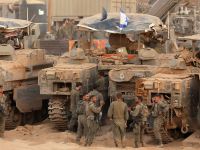By Assaf Assaf
Albawaba.com - Tizi Ouzou, Algeria
Ethnic Berber parties in Algeria have called for a strike in the province of Tizi Ouzou, while sources told Albawaba.com that authorized peaceful demonstrations were underway in Bejaia, 250 kilometers (150 miles) east of Algiers.
Meanwhile, the EU and NATO have ruled out intervention to end the ethnic violence, which has worsened the situation in a country already worn out by a decade-long civil war.
Two parties, the Rally for Culture and Democracy (RCD), which quit the government last week, and the Socialist Forces Front (FFS), called in a statement for a strike to start Saturday and last until May 11.
Shops in the minority Berber areas have been allowed to open for two hours a day so that people can shop for their daily needs.
In a related development, 15,000 activists from the FFS were allowed to stage rallies in the Algerian capital, the first since President Abdelaziz Bouteflika rose to power.
The demonstrators held Algerian flags and black banners to show sympathy with the families of dozens of ethnic Berbers killed in violent confrontations with the security forces.
Official statements have put the number of casualties at less than 50, while other sources estimated the fatalities at 60-80. Policemen lost their lives in the bloodshed, too.
Students also rallied in Algiers, where they handed to the prime minister’s office a statement in which they demanded “a halt to suppression in the Kabylie area.”
The rallies were marked by intensive presence of security forces, who ringed the protestors to make sure the marches would not deviate from their declared peaceful nature. The police cracked down on another rally which had not obtained permission from the authorities in Bejaia.
President Abdelaziz Bouteflika has promised to set up a commission to probe the rioting, the worst to hit Algeria since protests in October 1988 put an end to the single-party rule of the National Liberation Front (FLN).
"The president said nothing of any interest to us," one Tizi Ouzou resident had told AFP, while others in Bejaia described Bouteflika's speech to the nation last Monday as "useless."
Speaking after a meeting of RDC leaders, party head Said Sadi said the bloodshed in Kabylie was "a tragedy,” adding that "security forces never stopped firing real bullets at demonstrators."
The Berbers have longstanding grievances over Muslim fundamentalists, cultural discrimination, unemployment and overcrowding.
The Berbers, an indigenous people in north Africa who prefer to call themselves the Imazighen, make up about a third of the population, and many resent the imposition of the Arabic language and culture.
Bouteflika said he understood the Berbers' "impatience and frustration," and was at pains to stress that Berber, Arab and Islamic culture were enshrined in the constitution as the three fundamental elements of Algerian identity.
Demands for further cultural recognition would require changes to that constitution, he said.
But observers say it is not only a matter of culture and language. The Berbers also demand that their impoverished areas be improved and offered better services by the government.
EU, NATO REFUSE TO INTERFERE
Meanwhile, press reports said that the EU and NATO had ruled out intervening in the internal affairs of Algeria.
The Arabic daily El Khabar cited a statement by NATO as condemning “terrorist acts,” whatever the drive behind them, while the EU said the tragic events would not affect the negotiations being held with Algiers over economic partnership.
© 2001 Al Bawaba (www.albawaba.com)







